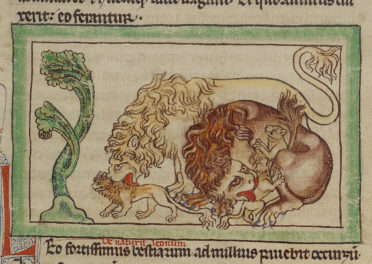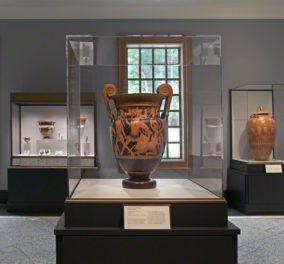
In rehearsal for The Heal: Eric Hissom (center) as Philoctetes, Emma Lou Hebert (left) as the Muse Calliope, and Eunice Bae (right) as the Muse Melpomene. Photo: Caleb Griffin
Each summer the Getty Villa invites audiences to experience a new adaptation of an ancient Greek or Roman play in its open-air theater evocative of the ancient Mediterranean. For 2019, playwright and director Aaron Posner is at work with Round House Theatre on The Heal, a contemporary adaptation of Sophocles’s tragedy Philoctetes.
Set during the Trojan Wars, the play follows the healing journey of the title character, a disabled veteran of war, and poses probing questions about forgiveness and friendship. Performances take place Thursdays, Fridays, and Saturdays from September 5 to 28 at 8pm; you can book tickets here.
In a conversation with Round House’s communications director Anna Mills Russell, Aaron Posner and Round House artistic director Ryan Rilette introduce us to the play and its blend of drama, music, dance, and humor.
Anna Mills Russell: Tell us about The Heal.
Aaron Posner: The Heal is my re-imagining of Sophocles’s Philoctetes, turning it into a modern, complicated parable about wounds and healing. Well, not complicated! “Deeply accessible and entertaining” is what I meant to say.
Ryan Rilette: It’s not complicated. It’s got dance and music.
AP: It’s a story about wounds, about healing, about the power of friendship. About how people move forward after damage and how the world can heal itself. It’s musical, it’s human, it’s complicated, and really engaging.
AMR: What makes the story relevant today?
RR: The play is about past transgressions and the ways we seek forgiveness—whether or not it’s possible for people to forgive great harms that were done against them.
It’s a theme that feels very immediate, and yet is asking big questions that people have grappled with throughout history.
AP: I think that’s exactly it. The questions it’s asking are timeless, but they feel kind of crazy timely because we’re in a very unforgiving place in the world right now. It feels like if you’ve done something wrong, that’s it—that’s who you are, that’s what you will always be.

Eric Hissom as Philoctetes in an early rehearsal of The Heal at the Getty Villa. Photo: Caleb Griffin
AMR: The Heal is based on a nearly 2,500-year-old play by Sophocles. What does ancient Greek drama offer us today?
RR: Ancient Greek drama is, maybe more than any other form of theater, a place where the actors and the audience are in dialogue with each other. Where there are big civic questions being asked. Looking back to the Greeks as a model is a great way for us to open up larger conversations about how we treat each other as people in the world.
AP: A lot of people are adapting the Greeks for the stage because we’re asking big questions about how we make our world work. What is the purpose of government? What is a society? How does society save itself?
If you’re going to talk about politics and society and community, there’s no better place to build from than the insights and complexities the Greeks were grappling with.
AMR: How did you go about reimagining Philoctetes?
AP: The act of reimagining has always been really compelling to me. It’s the way I get to work with geniuses in the room: Shakespeare, Chekhov.
My act of adaptation is all about forming a relationship between this original great work like Philoctetes and what I’m seeing in the world around me. I’m trying to form a friendship or a marriage—always—between those two sensibilities.
I love worlds that don’t actually exist. So [in the play] we’re living in the context of the Trojan War, but it feels a little bit like the Civil War, and a little bit like today. It’s clearly American and the language is my own. It has a very contemporary feel to it.
RR: It’s been interesting to watch the way you’ve adapted this. You started with the source material and then, as you’ve continued to refine it over many, many, many drafts, it has built into something with its own theatrical language.
That language is something that feels much more immediate. It closes the distance between the Greeks and us, while maintaining all the same large questions and ideas in the original text.

Eunice Bae as the Muse Melpomene in an early rehearsal of The Heal at the Getty Villa. Photo: Caleb Griffin
RR: Aaron, Philoctetes is a piece you’ve loved since you were like 16 years old. You’ve adapted a lot of things. Why now for this piece?
AP: I read the piece in high school, because I was just that cool in high school that I read Greek plays for my own enjoyment [self-mocking tone]. And it was a feeling of not understanding the rules—which is how high school felt to me—that Philoctetes goes through. While I found that compelling, I never necessarily thought it was something I wanted to explore as an adult.
Going back to the play, I found that what I connected to in high school is still there. I was instantly compelled.
AMR: How do you think that adaptations of ancient Greek drama help us connect with people who lived 2,500 years ago?
AP: Personally, I’m not interested in connecting with dead people [laughs].
RR: I was going to say the same thing.
AP: I’m interested in connecting people to each other. There’s something wonderful about this space at the Getty that feels like an ancient forum, where people gather under the sky to hear a story together. There’s something about that act that feels ancient and connected. Connection is just hard to find these days. I hope this can be that.
AMR: What effect do you hope The Heal has on people who come to see it?
RR: I hope and expect that some people will leave discombobulated. It asks big questions of you. Whether you’ve gone through serious trauma in your life and struggled to forgive others, or you’ve transgressed and are struggling to forgive yourself or seek forgiveness. If it does its job right, you will be questioning yourself—while also deeply enjoying this beautiful story, this amazing music, the dance that’s in this thing.
It’s a very lyrical play, but it should leave you with a lot to discuss. The ride home should be filled with conversation.
AP: It’s basically talking about wounds—both macro and micro. There’s no one who doesn’t have wounds in one way or another. And what’s funnier than death and wounds? That’s when we need humor.
RR: I always think of that great quote from Beckett: “Nothing’s funnier than unhappiness.” That’s Aaron’s writing, and it’s very very true in this script for sure.

In rehearsal for The Heal in the Getty Villa’s Outdoor Classical Theater, with the actors, creative team, and set in progress. At center is Eric Chong Shuch, choreographer. Photo: Caleb Griffin
AMR: Say a bit more about the experience of seeing an ancient play in the Getty Villa setting.
RR: It’s one of the most stunning spaces I’ve ever been in: you’re outside, the weather is gorgeous, you have this beautiful backdrop that transports you to another time and space. It gives you the room to contemplate, which is what these plays ask us to do. The beautiful thing about the Getty is that it has the perfect conditions for contemplation.
AP: And you’re in a museum of antiquities.
Unlike my glib answer earlier about not caring about dead people, we are living in relation to dead people. There’s something powerful about saying, “The questions we’re asking of you today? These are the same questions that have been asked for generation after generation after generation.” There’s something about the long view that happens when you’re sitting at the Getty that is pretty stunning.
This conversation was edited for brevity and clarity.




Thank you all for sharing this worthwhile event and bringing it to the general public . Agree we have become so convoluted let’s go back to a time where thinking about the core basics can center us into being better humans.